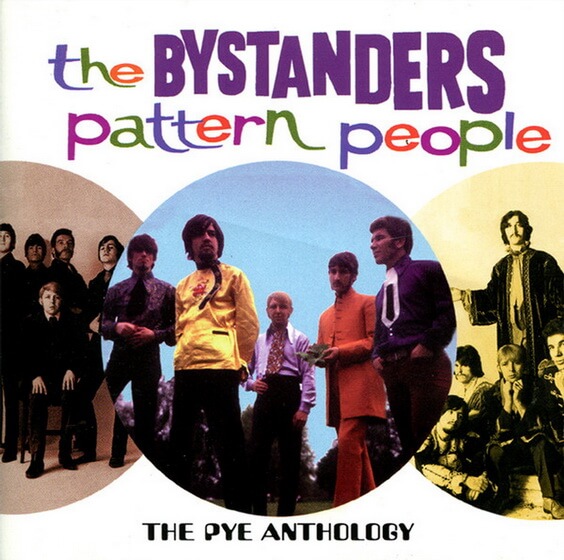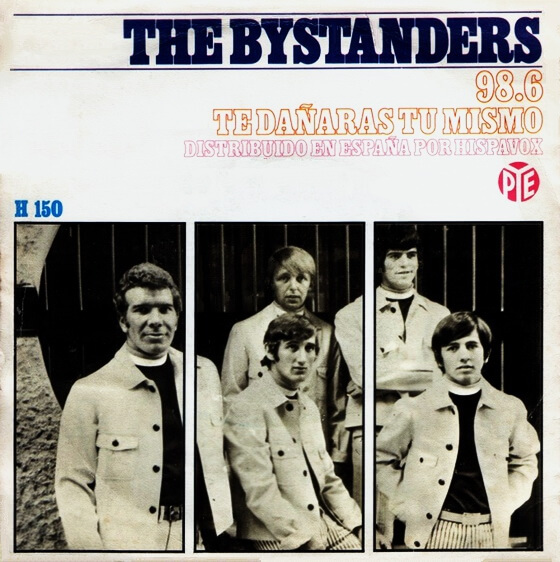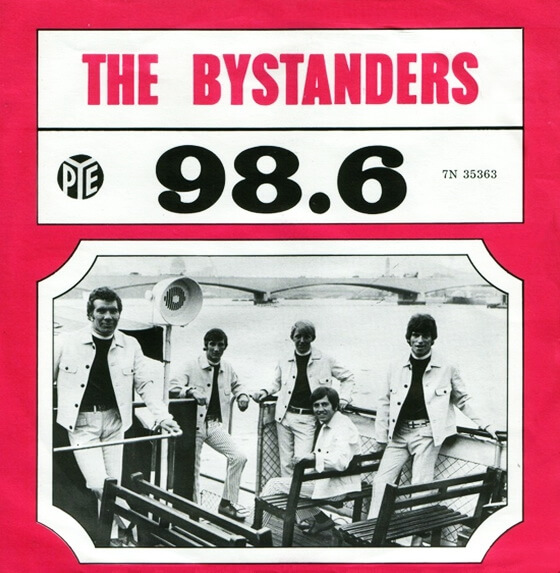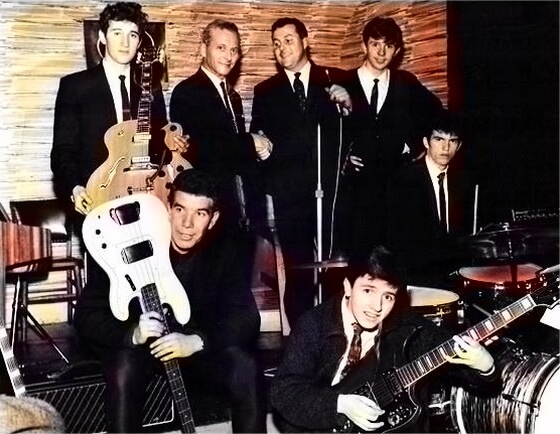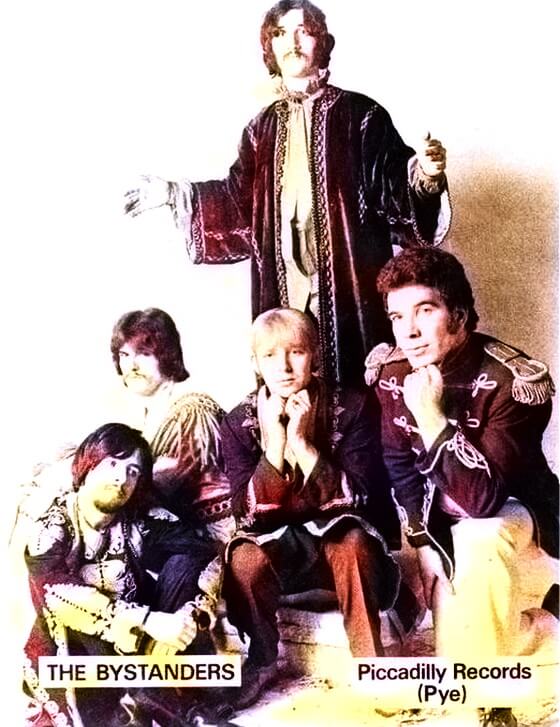Исполнитель: The Bystanders
Откуда: Wales
Альбом: Pattern People (The Pye Anthology)
Год выхода: 2001 (recorded in 1965-1968)
Жанр: Beat/Psychedelic/Pop Rock
Формат: MP3 CBR 320
Размер архива: 127 MB
Группа из Merthyr Tydfil (Южный Уэльс), образованная в 1962 году. Играли в многочисленных клубах в Уэльсе. Были настолько популярны, что иногда выступали в нескольких клубах за ночь. В период с 1966 по 1968 год выпустили восемь синглов. С уходом вокалиста Vic Oakley и добавлением гитаристов Deke Leonard и Martin Ace (оба из «Dream») в конце 60-х годов «The Bystanders» изменили свое название на «Man». В 2001 году лейбл «Castle Music» выпустил альбом с песнями коллектива на «Pye Records» в 60-х годах, добавив к основному материалу семь ранее никогда не издававшихся песен.
From Merthyr Tydfil, Wales. A fine pop act with the odd excursion into psychedelia. The Bystanders formed in 1962 and played the local Welsh clubs. There were two local bands in Merthyr Tydfil. The Rebels consisted of Mickey Jones, Ray Williams and Jeff Jones. The Crescendos contained Clive John and Lynn Mittell. Clive and Mickey took the best of the two bands resulting in a five-piece of: Mickey Jones (guitar), Ray Williams (bass), Lynn Mittell (vocals), Clive John (organ) and Jeff Jones (drums). Without a name, Cardiff promoter Don Collier-Roberts booked the group as the «Mystery Men» until The Bystanders was chosen for the group. The group became successful locally and did gigs with Unit Four Plus Two, Sounds Incorporated and Bert Weedon. Working and gigging became too strenuous and the group decided to go professional, giving up their jobs. The Bystanders fashioned themselves musically along the lines of the US harmony pop groups such as The Beach Boys, The Four Seasons and The Tokens. When the group played in Swansea, local hairdresser Wynn David, who had a successful business there, became their financial backer due to his love of music. With Wynn’s presence, the members also took new names for stage use: Mickey Jones became Mike Martin (aka Steel); Ray Williams became Ray (aka Robin) Selby; Lynn Mittell was Jerry Braden; Clive John changed to Clive Morgan and Jeff Jones as Jeff Curtis. In 1965, with Wynn’s financing, the band travelled to ITC Studios in London to record a debut single, «That’s the End» b/w «This Time» on the Pylot label. The label was created by Wynn David who financed the release and it was only sold in local shops. Without major distribution, the record received no airplay and consequently did not sell well. Lynn Mittell left the group and Swansea resident Vic Oakley became the new vocalist. Manager George Cooper took the band to Pye Records who signed them to their subsidiary Piccadilly label. The group moved to London and played gigs in the area to re-establish themselves. The first Piccadilly release was a cover of «(You’re Gonna) Hurt Yourself» featured on Frankie Valli’s first solo album. The next release «My Love — Come Home» failed to gather significant sales. The first two Piccadilly singles had a slightly middle of the road sound to them due the fact that manager George Cooper booked the group into cabaret clubs and felt these tracks would appeal to this audience. Upward of six shows a week were recorded for the BBC. «98.6» was a cover of American Keith’s top ten single but it also failed to chart for The Bystanders. The group also recorded demos at R.G.Jones Studios for songwriters signed to the George Cooper Organisation. Ronnie Scott (co-writer with Marty Wilde) who was the publisher for the George Cooper Organisation wrote the group’s next release «Royal Blue Summer Sunshine Day». This was followed by a cover of Jimmy Webb’s «Pattern People» from The 5th Dimension «Up, Up and Away» album. The Piccadilly imprint folded after the release of this single and the band moved to the parent Pye label. The next single was «When Jezamine Goes» written by Marty Wilde and Ronnie Scott under the pseudonym of Maston and Gellar produced by John Schroeder. The release was a dismal failure but The Casuals’ release of the song three months later as «Jesamine» soared to number two on the UK charts. Hidden on the flip side of «When Jezamine Goes» was the brilliant «Cave of Clear Light», now considered a psych classic. One last stab at success was attempted with the recording of «This World Is My World» composed by singer/songwriter Albert Hammond but fame and fortune was again to elude the group. The band continued to gig in the cabarets as The Bystanders and eight months after the release of their last single, «Sudden Life» was issued on Pye under the new group name of Man. Deke Leonard (guitar and vocals) was the first new member in while the group were still The Bystanders, followed by Martin Ace to replace bassist Ray Williams and Terry Williams came in on drums when Jeff Jones left. This had completed the transformation of The Bystanders to the newly-formed progressive rock artists Man.
Tracks:
01. That’s The End — 2:31
02. This Time — 1:38
03. (You’re Gonna) Hurt Yourself — 2:28
04. Have I Offended The Girl — 2:32
05. My Love — Come Home — 2:22
06. If You Walk Away — 2:17
07. 98.6 — 3:19
08. Stubborn Kind Of Fellow — 3:05
09. Royal Blue Summer Sunshine Day — 2:12
10. Make Up Our Mind — 2:55
11. Pattern People — 2:41
12. Green Grass — 2:00
13. When Jezamine Goes — 3:15
14. Cave Of Clear Light — 3:42
15. This World Is My World — 2:23
16. Painting The Time — 2:31
17. Stay A Little While (Previously Unissued) — 2:48
18. You’re Ready Now (Previously Unissued) — 2:40
19. Cheryl’s Going Home (Previously Unissued) — 2:13
20. The Little Girl I Once Knew (Previously Unissued) — 2:39
21. Dang Me (Previously Unissued) — 2:37
22. My Way Of Thinking (Previously Unissued) — 2:38
23. Grapevine (Previously Unissued) — 2:40
Personnel:
Vic Oakley — vocals (1965-68)
Mickey Jones (aka Mike Martin, Mike Steel) — guitar
Ray Williams (aka Ray Selby, Robin Selby, Rabin J. Selby) — bass
Clive John (aka Clive Morgan) — organ
Lynn Mittell (aka Gerry Braden, Jerry Braden, Owen Money) — vocals (1962-65)
Jeff Jones (aka Jeff Curtis) — drums (1962-68)
Deke Leonard — guitar, vocals (1968)
